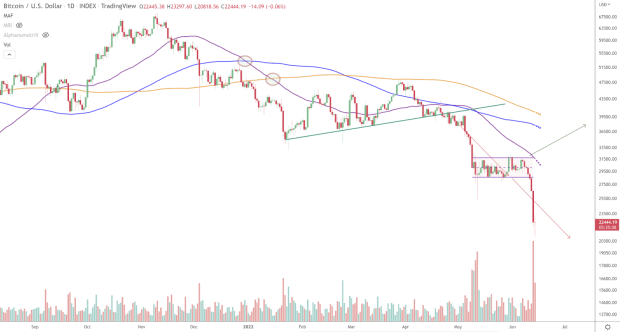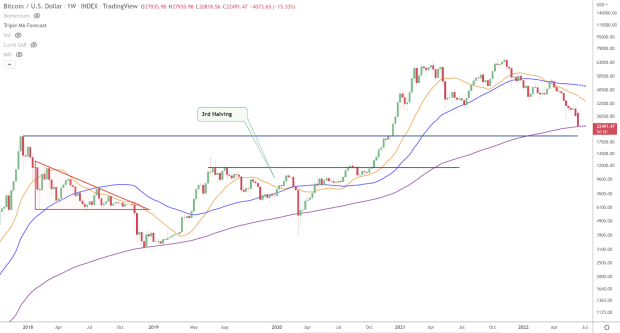Are we witnessing the end of bitcoin’s typical four-year cycle? How does European adoption of the World Economic Forum’s agenda impact the euro?
Watch This Episode On YouTube or Rumble
Listen To The Episode Here:
“Fed Watch” is the macro podcast for Bitcoiners. Each episode we discuss current events in macro from across the globe, with an emphasis on central banks and currency matters.
In this episode of the “Fed Watch” podcast, I sit down with Tone Vays, a true Bitcoiner and long-time price and macro analyst of Bitcoin. Our discussion ranges from the current conditions to bitcoin cycles to broader macro topics including the state of U.S. politics, Europe and the euro.
You can find the charts for this episode here.
Current Bitcoin Market Conditions
In the first segment of the podcast, Vays talks about the psychological state of the bitcoin market.
“I was around for the last two bear markets. 2013 was the classic bubble chart, you were mentally prepared for what’s to come. 2017, again, the ICOs, it was an unreasonable exponential rise, so you were mentally prepared. I wasn’t mentally prepared for this one. Because, when the top came in April 2021, we had an incredible amount of good news. Michael Saylor, Elon Musk, Jack Dorsey leaving Twitter to go all in on Bitcoin with Square [now Block], El Salvador [legal tender law], then El Salvador buying bitcoin.
“That turned into a sell the news event. 50% correction, no big deal. Everyone was mentally fine with it. Then, this is where it’s all about your mental state. When we went back and broke that top in November, that was the breakout. Everyone thought we were going higher; I thought we were going higher. That fake out in November was mentally brutal. We crashed back to the $30,000 low, broke down to $20,000, and over the last three to six months people have been very, very concerned.
“This prolonged move has made people tighten their belts. Mentally, they feel like they were cheated and don’t think bitcoin should be at these lows. Bitcoin was built for this world we are seeing right now with all the uncertainty. They are stealing bank accounts from not just individuals, like in Canada, but from sovereign countries. Bitcoin was built for this, but the price keeps going down. People are starting to throw in the towel. Everyone is saying lower, lower, lower. This is where I have to believe that the majority is always wrong.”


Bitcoin Cycles
I asked Vays about bitcoin valuation models and four-year cycles. My question is whether they are all broken and if we need to find a new model.
He said he thinks models always fail. Stock-to-flow is theoretically correct in Vays’ mind, but it cannot be successfully used as a technical indicator. As for the four-year halving cycle, Vays believes that it is partly due to hype and partly due to actual supply shocks.
That is my position here on “Fed Watch” as well. The four-year halving cycle has its own hype cycle, completely separate from the overall bitcoin hype. Kind of similar to how altcoins try to hype their hard fork upgrades, bitcoin accomplishes that naturally through the halving.
However, I think the hype is lessening with each cycle, along with the supply shock aspect. That is why I now believe we have a two-year cycle of sorts. A smaller effect from the halving but one that still causes an echo a couple years later.
Vays insightfully points out that there is much less of a clear distinction between bull and bear markets. Price action in 2020 and 2021 do not lend themselves to a clear dividing line. Going forward, it will become harder to delineate these cycles.
Europe Crisis And Global Macro
We started running up on our hard time limit before we got into the juicy stuff, so hopefully we can have Vays back on in a few months to continue this discussion. But we did get his opinions on Europe and the euro.
“I will say that I have a very low opinion of Western Europe. It’s nice; you go there and it’s safe. You can walk around the street; you feel fairly safe. It has remnants of a collapsing capitalist society, as they hand over all power to the World Economic Forum (WEF). I believe that the WEF is a liberal, socialist organization. They have too much control over politics. To quote Klaus Schwab, ‘We have penetrated the cabinets.’ And they have.
“I think the path of the WEF is a very, very dangerous path, and I short the future of Western countries that buy into its power. That’s why I’m very bearish on Europe. I think the common currency will break up.”
We talk about so much more, from bitcoin’s correlation to stocks and altcoins, to monetary policy. This is one of my favorite episodes we’ve ever done on “Fed Watch,” so it is definitely a must-listen.
That does it for this week. Thanks to the readers and listeners. If you enjoy this content, please subscribe, review and share!
This is a guest post by Ansel Lindner. Opinions expressed are entirely their own and do not necessarily reflect those of BTC Inc. or Bitcoin Magazine.






















